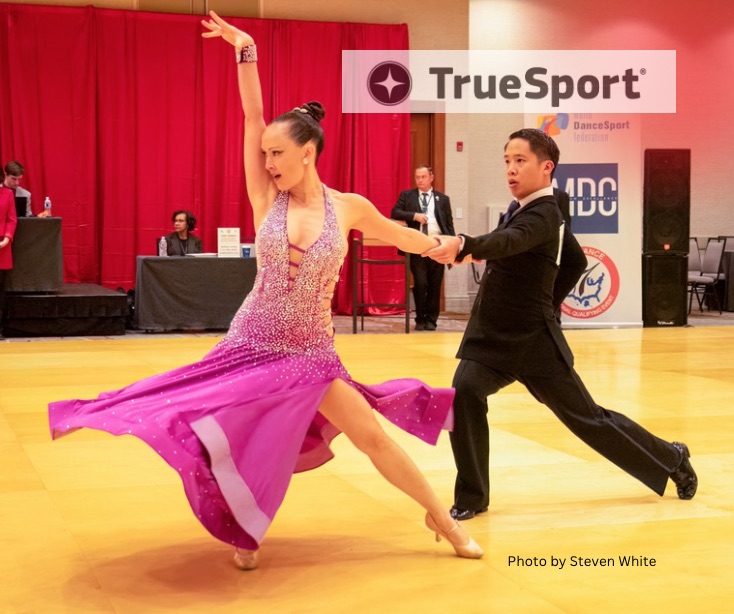Editor’s Note: TrueSport has published a series of self-care articles that may be beneficial to all of our dancers. Over the next few weeks, American Dancer will be releasing them to you. This is the first.
Self-care is often misunderstood, and in the sports community, it can be viewed as lazy or as a way to justify obsessive behaviors. In reality, self-care should be about finding and intentionally practicing experiences that make you feel renewed.
Here, Dr. Melissa Streno, TrueSport Expert and licensed clinical psychologist, explains exactly what self-care is, and how you can harness its power to boost your physical and emotional health while also meeting your athletic goals.
What is self-care?
Self-care is essential for athletes—especially athletes with busy lives. “When I talk about self-care with athletes, I explain that it’s essentially self-maintenance,” Streno explains. “Self-care is what enables us to keep going at our fullest capacity, makes us feel good, and makes life feel a little easier. It helps boost our mood and contributes to many of our health or fitness goals. It’s the act of taking time for yourself and finding activities that help you slow down, rest, recharge, and reconnect. When you practice self-care, you’re slowing down and checking in with yourself.”
But how can self-care help me as an athlete?
“When we’re training, there is often a risk of over-training or overuse,” says Streno. “Intentional self-care that revolves around slowing down your body and brain can help you avoid these issues. You need to give your body and your brain a break on a regular basis through a self-care practice, and that helps you come back stronger and helps you recover faster. It also helps you be a better teammate and be able to better connect with your fellow athletes and coaches from a healthier, happier place.”
What isn’t self-care?
Unfortunately, self-care can be used to justify obsessive eating, training, and recovery behaviors—especially for athletes who are trying to perform at a high level, says Streno. Too much emphasis on “healthy” self-care, especially around physical health, can actually ruin the enjoyment of those activities and even lead to harmful behaviors.
Self-care can also be misused as a way to skip out on commitments you’ve made to yourself and others. Streno notes that when your solo self-care is causing you to miss out on time with friends and family, that can be a sign that you’ve taken it too far. Yes, sometimes, you truly do need to step back from commitments and take a break, and boundary setting can be a form of self-care. But in those cases, it’s important to determine how you can avoid that happening again in the future.
Finally, self-care doesn’t have to be expensive. Too often, Streno hears people say they can’t afford self-care, but there are many free versions of self-care. Instead of booking a professional massage, for instance, your self-care could be spending 15 minutes stretching or using a foam roller.
What should I be doing for self-care?
Self-care needs to be authentic to you and it needs to be done intentionally, says Streno. This is where many of us get self-care wrong. We generally think that self-care has to involve bubble baths or meditation sessions. But if you hate those things, you’re just turning self-care into another chore rather than something that actually benefits you, Streno explains.
Self-care means taking care of yourself—which needs to feel good to you. It will also change depending on the type of self-care you need at different times. Some days, you may need self-care that puts you in contact with friends and family, and other days, a quiet solo activity like painting can be exactly what you need. It also needs to be done intentionally, meaning that you’re focusing on the task at hand and truly enjoying the moment, rather than it being just another part of your day.
To get started, Streno suggests asking yourself: “If you had a free day where you couldn’t work, study or train, what do you wish you would be doing with that time?” This list of activities can be a blueprint for the different types of self-care you should work into your schedule.
How can I prioritize self-care when I’m busy?
First, you can make time for self-care by scheduling it into your day. Try putting self-care onto your calendar and treating it like an appointment with yourself, says Streno. And keep the type of self-care you’ll do open-ended, so that you can adjust to what feels right in that time, whether it’s a 30-minute call with your best friend or an hour watching your favorite show.
If you’re in the middle of a busy semester, consider the idea of self-care ‘snacks,’ says Streno. These can be self-care moments stacked on top of things you’re already doing, like putting on a favorite song while driving to school and really enjoying the three minutes it’s playing. It could be taking time to text a friend or family member who always makes you feel happy while you’re waiting for the microwave to warm up your breakfast. And if you truly feel too busy, do a time audit to see where you are spending your time: Are you scrolling on social media before going to bed and feeling worse, not better, by the time you finally go to sleep? There may be some habits you can swap for better self-care practices.
Are there limits to self-care?
It is important to remember that self-care can’t cure everything. A movie night with a friend may help you feel better when you’re having a tough week at practice, but if practice always leaves you fully drained and flat, the self-care you need could be talking to a therapist or speaking to your coach about a more manageable schedule. And of course, self-care can’t do your homework or your chores. If you find that you can’t balance self-care, school, sports practice, and all your other obligations, Streno says it’s important to look at what you can subtract from your responsibilities so you can make time for the things that truly matter.
Takeaway
Self-care is a critical part of your journey as an athlete, and you need to make time for yourself and for these activities that help you slow down, rest, recharge, and reconnect. Self-care should feel good for you, rather than reflect what everyone else is doing. Even carving out a few minutes of time for self-care during a busy day can make a big difference to your ability to meet your athletic and academic goals, while taking care of your mental and physical health.






















